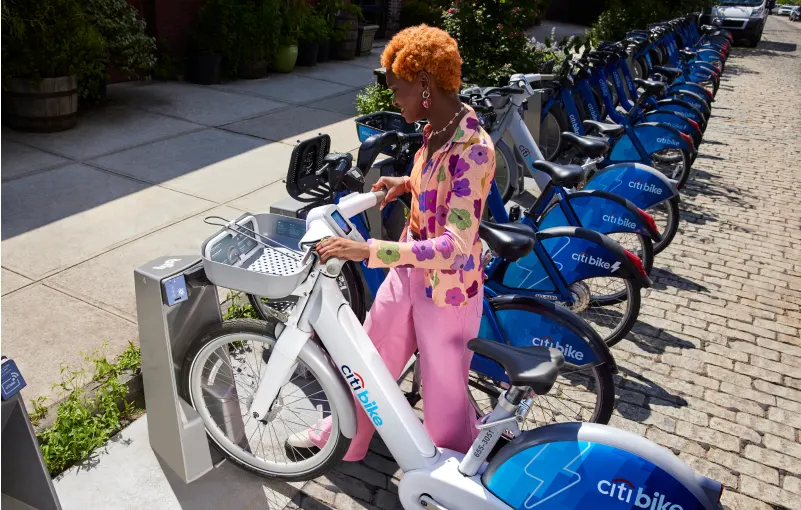This is an end to end data engineering project, This project uses Citi Bike's NYC bikeshare dataset, Citi Bike is the nation's largest bikeshare program, with 25,000 bikes and over 1,500 stations across Manhattan, Brooklyn, Queens, the Bronx, Jersey City, and Hoboken.
The purpose of this project is to make an end to end data pipeline which extracts the Citi bike data from the web https://s3.amazonaws.com/tripdata/index.html and Load this data in Google Cloud storage and Big Query , apply Kimbal Dimensional Modeling(Facts and Dimensions tables) to the data using dbt and build a Looker dashboard to vizualize:
- Daily riders activity
- Trips per start stations
- Average trip duration
- Bike type distribution and Membership status distribution
- Rides per month and year
The following technologies are used to build this project
- Terraform - as Infrastructure-as-Code (IaC) tool
- Google Cloud Storage (GCS) - as Data Lake
- Prefect - for orchestration
- dbt - for transformation and data modeling
- Google BigQuery - for Data Warehouse
- Google Looker studio - for visualizations
| Column | Description |
|---|---|
| r_id | Unique surrogate built using ride_id and started_at |
| ride_id | Unique ID Assigned to Each Citibike Trip |
| rideable_type | Type of bikes user can take out (Docked, Classic, Electric) |
| started_at | Start of Trip Date and Time |
| ended_at | End of Trip Date and Time |
| start_station_name | Name of start station |
| start_station_id | Unique Identification Number of Station the Trip Started at |
| end_station_name | Name Assigned to Station the Trip Ended at |
| end_station_id | Unique Identification Number of Station the Trip Ended at |
| start_lat | Latitude of the Start Station |
| start_lng | Longitude of the Start Station |
| end_lat | Latitude of the End Station |
| end_lng | Longitude of the End Station |
| member_casual | Field with Two Values Indicating Whether the Rider has a Citibike Membership or Paid with Credit Card(Casual) |
Check out the interactive dashboard here
- First fork this repo, and clone it to your local environment.
git clone https://github.com/mojafa/citi-bike.git
- Setup your Google Cloud environment
- Create a Google Cloud Platform project
- Configure Identity and Access Management (IAM) for the service account, giving it the following privileges:
- Viewer
- Storage Admin
- Storage Object Admin
- BigQuery Admin
- Download the JSON credentials and save it, e.g. to
~/.gc/<credentials> - Install the Google Cloud SDK
- Let the environment variable point to your GCP key, authenticate it and refresh the session token
export GOOGLE_APPLICATION_CREDENTIALS=<path_to_your_credentials>.json
gcloud auth activate-service-account --key-file $GOOGLE_APPLICATION_CREDENTIALS
gcloud auth application-default loginCheck out this link for a video walkthrough.
- Install all required dependencies into your environment
conda create -n citibike python=3.10
conda activate citibike
pip install -r requirements.txt- Setup your infrastructure
- Run the following commands to install Terraform - if you are using a different OS please choose the correct version here and exchange the download link and zip file name
sudo apt-get install unzip
cd ~/bin
wget https://releases.hashicorp.com/terraform/1.4.1/terraform_1.4.1_linux_amd64.zip
unzip terraform_1.4.1_linux_amd64.zip
rm terraform_1.4.1_linux_amd64.zip- change the variables.tf file with your corresponding variables, I would recommend to leave the name of the dataset, table and bucket as they are; otherwise you need to change them in the prefect flows and dbt.
- To initiate, plan and apply the infrastructure, adjust and run the following Terraform commands
cd terraform/
terraform init
terraform plan -var="project=<your-gcp-project-id>"
terraform apply -var="project=<your-gcp-project-id>"- Type 'yes' when prompted.
- Setup your orchestration
- If you do not have a prefect workspace, sign-up for the prefect cloud and create a workspace here
- Create the prefect blocks via the cloud UI or adjust the variables in
/prefect/prefect_blocks.pyand run
python prefect/prefect_blocks.py- To execute the flow, run the following commands in two different terminals
prefect agent start -q 'default'python prefect/web_to_gcs_to_bq.py- After running the flow web_to_gcs_to_bq.py you will find the data at Citibike_data_raw.Citibike_default_data, the flow will take around 45 mins to complete.
- Data tranformation and modeling using dbt
cd into the dbt/Citibike_project directory and run the following command
dbt build --var 'is_test_run: false'You will get 4 tables in Citibike_data_dbt data set
- dim_neighbourhoods
- Citibike_stations_lookup
- facts_citibike
- stg_citibike_data
- Data Vizualization and Dashboarding
- You can now query the data and connect it to looker to visualize the data, when connecting to data source use facts_citibike table to build the data source in looker, dont use partitioned table, as you wont get any data in your report.
- go to Looker Studio → create → BigQuery → choose your project, dataset & transformed table.
- Future work
- Add tests.
- Add CI/CD pipeline.
- Github Actions workflow to run Terraform steps (like here).
- Make incremental model, to append only the latest data from each load.
- Transformations, documentation and data quality tests in dbt.
- Dashboard status tiles (like here).
- Include
r/dataengineeringsubreddit posts. - More text analysis with NLP.
- Use GPU with my VM instance.
- Streaming process with Kafka and Spark.

